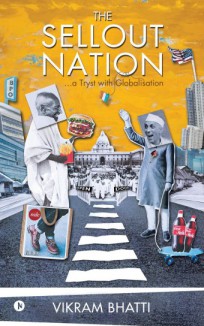A witty, satirical account of globalisation

Book The Sellout Nation: A Tryst with Globalisation
Author Vikram Bhatti
Pages 228
Publisher notionpress.com
Price Rs 290
Rajkumari Sharma Tankha
Why I picked up The Sellout Nation …a Tryst with Globalisation is because I was thoroughly exhausted of the number of chick lit romances I was deluged with. I wanted something different, and the blurb on the back cover promised me that. And I must say, I was not disappointed.
Written by economics graduate Vikram Bhatti, a storyteller-cum-filmmaker-cum-artist, The Sellout Nation is a satirical account of happenings in our country. It talks about globalisation of India and boldly tackles the issue of deep-rooted corruption, with not so indirect references to our politicians.
The story is set in the Republic of Bharatpur (India, obviously), infamous for its poverty, potholes and huge population. It takes potshots at the politicians, especially the current crop, irrespective of the party they belong to. At the same time, the author minces no words in castigating the “gullible” people as well who get fooled by powers-that-be; people who are so poor that they will believe anyone for a samosa and jalebi, without caring to use their brains.
Under the newly signed “Open Your Door Policy”, Bharatpur is about to have a huge makeover which promises to turn the country into India Nagar, a modern-day metropolis, full of international brands and products. This has been promised to the people by two international visitors, George W Push and Pamela Lewinsky, the President and the First Lady Secretary of the global superpower USK. Here the author lays bare the capitalistic model that will transform Bharatpur, through deceit and muscle and money power, from a small town into a modern city.
The resemblance to India’s “globalisation” which turned the country from a self-reliant agrarian nation into just another market for the Western powers, is too apparent to be missed.
Through the book, the author has made a strong case against globalisation comparing it to the many foreign invasions that India has faced in the past; eliciting the many times that we have fallen prey to international deceit and lost our freedom. Without mincing his words, the author calls FDI as Foreign Direct Invasion (not investment).
You just cannot miss the connection of Bharatpur to Bharat or India.
I only wish the author was a little subtle in his satire, he is too much in the face, be it the name of the place or the character.
Sample this:
However, Rahul Bhaiya didn’t give two hoots about local jokes, local cows, or the Locals at large, and instead of activating local campaigns he busied himself with activating local scams and opening foreign bank accounts in the name of his children, he simply dropped his pyjamas, while Thakurain, his equally fat and greedy wife, happily lifted her sari, hoping to give birth to yet another healthy bank account.
But perhaps that is his intent — to have an in-the-face-satire.
Through this work of fiction, Bhatti has shown his deep love for the country as well as the pain he feels at the rot that has been set in due to globalisation. Each page of the book seems to be proclaiming, “root for localisation”.
All in all, a refreshing effort at taking out the angst of an apolitical common man.


